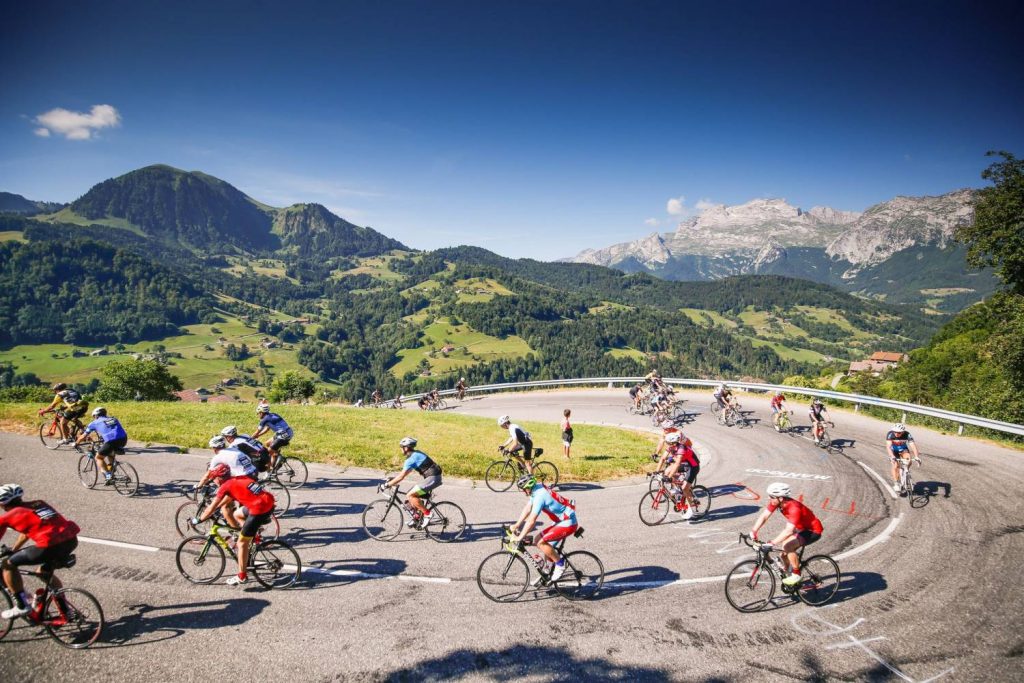‘Am I good enough to cycle The Alps?’
This is the most common first question we get when we receive enquiries from new customers. Whilst the answer is almost always ‘YES’, we will give some advice on how the cyclist can best prepare for the trip. In this blog post, we’ll detail a beginners guide to taking on The Alps on your bike, and what steps you can take pre-trip in order to ensure you are as prepared as you possibly can be.
Base Level
Level 1, the base skill and fitness level that we look for in riders can be attained fairly easy, with the right preparation. What we will expect from a Level 1 rider is for you to be capable of riding 30-40 miles per day, including some hills in rolling countryside. This level of fitness would generally be attained through a steady level of partaking in sports and physical activity on a consistent basis.
You Enjoy Cycling, But Not Sure If You Are Fit Enough For The Alps
To get to Level 1, you will want to put a training plan together for the duration of 3-4 weeks, in which your aim will be to comfortably cycle for 50 miles in a single day. The reason that we ask for this standard of distance is due to the fact that typically one mile cycled in the Alps, may feel like two miles cycled at home. We understand that there are not many locations in the world that can replicate the landscape that The Alps so stunningly provide, so adding in different elements to your training is key.
You should focus on:
- Distance – 50 miles p/day
- Endurance – Climbs at home and resistance training on a stationary bike
- Time – 2-3 hours of training in a day
Equipment
The Alps can be unpredictable in terms of weather, so making sure you have clothing to cover all bases will ensure your highest level of comfortability during the trip. You will be looking to have at the very least, a windbreaker for descents(wind chill), a fleece for colder days, and your typical cycling clothing on top of that. An MTB type shoe is preferable as it is seen as the most versatile when it comes to walking, dismounting and of course, cycling. You must have an emergency kit for your bike, including at the very least, a pump, spare inner tubes and any small tools you need to make adjustments to your bike.
Bike Choice
You’ll need a road bike in good working order with gearing to suit the mountainous terrain that you’ll be tackling. Having low gears at your disposal will assist you to keep pedalling smoothly up the long climbs that you’ll encounter. Compact or triple chainsets are the way to go to make life easier for you. Gearing can often be quickly and relatively cheaply altered by replacing the cassette on the rear wheel.
Accommodation
Whilst on Tour either in the Alps or Dolomites we use local two or three-star hotels. We have always carefully chosen them to make sure they are of a high standard and offer excellent food (we are well aware this is a pre-requisite for cyclists). Rather than go through each one individually here are the links to some of the hotels we use on our various trips:
Caprile – Sella Ronda www.hotelmontanina.com
Merano – Stelvio http://www.thurm.it/en/index.htm
Santa Caterina – Passo Gavia https://www.3signori.it/
Bosco del Grappa – Monte Grappa http://www.gardenrelais.it/en/
La vallée Blanche – Valberg http://www.hotel-lavalleeblanche.com/
Hotel Ancolie – Champagny-en-Vanoise http://www.hotel-ancolie.com/en/
Hotel Bellier – Val d’Isere http://www.hotelbellier.fr/
Getting There
Unless otherwise stated, our programmes all include return transport in our minibuses from Geneva airport to Chalet Nicola in Le Praz. Geneva offers lots of flight options from different UK airports including low-cost flights with Easyjet. Journey time is around 1 hour 45 minutes. Contact us so that we can recommend the best arrival times to coincide with our transfers and to help you take advantage of cheap and convenient flights.
Please feel free to have a look at our cycling programmes for 2019. You can also contact us by clicking link in the top right of the website for any enquiries you may have.

